Free Anti-war Music Generator Powered by AI
Turn text into high-quality Anti-war music effortlessly – no login required!
music.toolTips
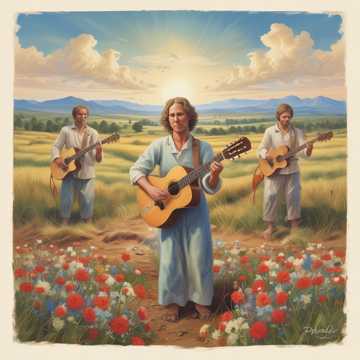
Хватит воевать!
'Хватит воевать!' - это мощный призыв к миру, выраженный через сочетание рока и мелодичного металла. Песня обращается к вере и любви как альтернативе войне, используя религиозные образы и эмоциональные музыкальные элементы для усиления своего послания.
02:55
2024-07-26

Хватит воевать!
'Хватит воевать!' - это призыв к миру, выраженный через готический мелодичный метал. Песня противопоставляет войну и веру, призывая заменить оружие молитвой и любовью к Богу. Атмосферное звучание подчеркивает глубину послания.
02:53
2024-07-26

Хватит воевать!
'Хватит воевать!' - это мощная рок-баллада, призывающая к прекращению войны и обращению к вере. Песня сочетает элементы готического металла с атмосферными инструментами, создавая эмоциональный призыв к миру, единству и духовному возрождению.
02:50
2024-07-26

Нет войне и вражде!
Песня 'Нет войне и вражде!' - это мощный призыв к миру и единству, выраженный через сочетание рэпа и рок-музыки. Lyrics наполнены религиозными мотивами, призывающими отвергнуть вражду и обратиться к вере и любви как пути к гармонии.
02:37
2024-07-26
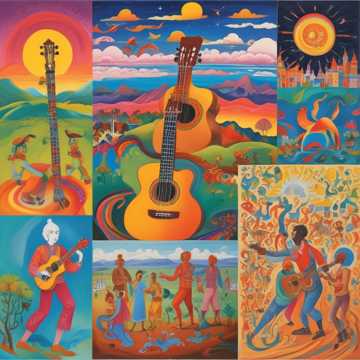
Россия, Украина и Бог
Песня 'Россия, Украина и Бог' - это мощный рок-гимн, призывающий к миру между двумя странами. Она подчеркивает важность веры, единства и прекращения братоубийственной войны, предлагая музыку и танец как альтернативу конфликту.
03:55
2024-07-26

Schlacht gegen Brüder
'Schlacht gegen Brüder' ist ein intensiver Rock-Song, der die Tragik eines Bruderkriegs thematisiert. Er zeichnet ein düsteres Bild von Kampf, Verlust und Sinnlosigkeit, untermalt von kraftvoller elektrischer Instrumentierung.
02:41
2024-07-25

years
'Years' is a provocative rock anthem generated by AI, chronicling decades of conflict. It combines a rhythmic recitation of years with intense repetitions of 'war', culminating in an explosive expression of anger and frustration.
04:00
2024-07-25

Не отдадим наших детей войне!
Песня 'Не отдадим наших детей войне!' - это мощный призыв к миру и единству. Она выражает стремление народа к жизни без войны, коррупции и лжи, подчеркивая важность семьи и любви в построении лучшего будущего.
02:29
2024-07-25

Мы хотим жить без войны!
Эмоциональная композиция о стремлении к миру, единству и любви. Песня призывает отказаться от войны, коррупции и лжи, подчеркивая важность семьи и общности. Мелодия сочетает поп и госпельные элементы, создавая атмосферу надежды и решимости.
02:06
2024-07-25
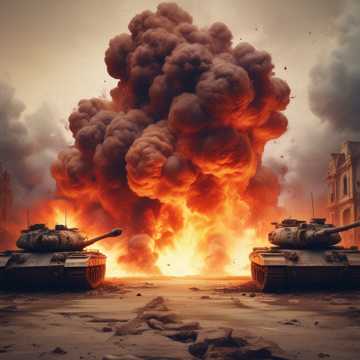
tanks fall
'tanks fall' is a poignant exploration of warfare and resilience. Set against a dreamy, theatrical backdrop, it juxtaposes heavy themes with ethereal female vocals and piano. The song paints a vivid picture of battle, emphasizing the clash between steel and human determination.
02:12
2024-07-25

Soldaten fra helvede
'Soldaten fra helvede' er en psykedelisk og fængende komposition, der udforsker krigens brutalitet og en soldats indre kamp. Sangen blander mørke temaer med hypnotiserende melodier, hvilket skaber en kraftfuld og tankevækkende lytteoplevelse.
02:45
2024-07-25

e3
'e3' é uma obra introspectiva que retrata a luta contra a escuridão e o desejo de paz em um mundo caótico. Combina elementos de emocore e funk, com vocais expressivos e solos instrumentais, criando uma atmosfera de reflexão e esperança.
02:37
2024-07-24

e1
'e1' é uma poderosa balada que mistura metal e emocore, abordando temas de guerra, desesperança e a luta pela paz. Com vocais femininos emocionantes e instrumentação intensa, a música retrata a jornada da humanidade através da escuridão em busca de luz e harmonia.
03:47
2024-07-24

a4
'a4' é uma potente mistura de metal e emocore que explora temas de guerra, desesperança e a busca pela paz. Com vocais intensos e instrumentação variada, a música oscila entre momentos de reflexão sombria e vislumbres de esperança.
02:29
2024-07-24
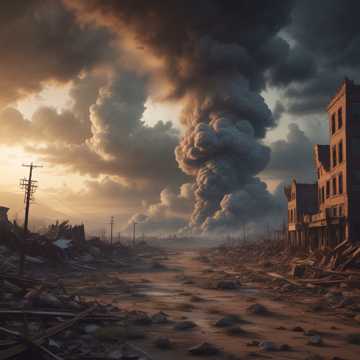
Zombie
'Zombie' is a poignant rock ballad that confronts the cyclical nature of violence and its impact on society. Through evocative lyrics and a haunting melody, it paints a vivid picture of generational trauma and the futility of conflict.
03:32
2024-07-24
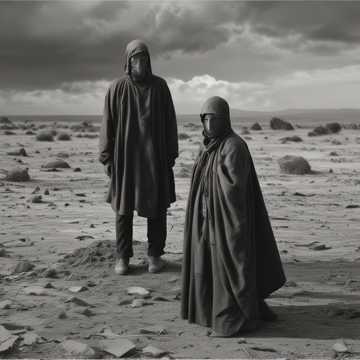
Zombie
'Zombie' ist eine eindringliche Ballade über die verheerenden Auswirkungen von Krieg und Gewalt. Der Song verbindet emotionale Texte mit einer intensiven Melodie, um die Zyklen des Konflikts und das daraus resultierende menschliche Leid zu reflektieren.
02:59
2024-07-24
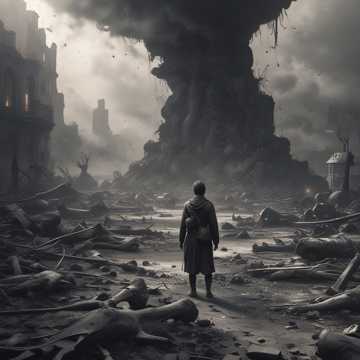
Zombie
'Zombie' is a poignant critique of cyclical violence, blending emotive vocals with gothic and schlager elements. It juxtaposes personal tragedy against historical conflict, using the zombie metaphor to depict societal indifference and the perpetuation of violence.
03:15
2024-07-24

Eve Of Destruction
'Eve Of Destruction' is a poignant protest song that paints a vivid picture of a world on the brink of collapse. It touches on themes of war, social unrest, political turmoil, and environmental devastation, urging listeners to wake up to the impending doom.
04:00
2024-07-24
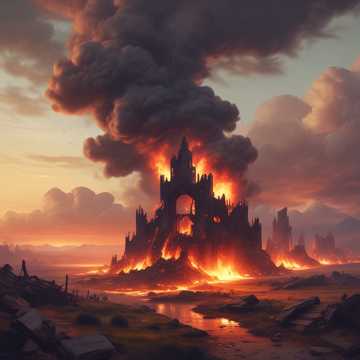
Terror's Grip
'Terror's Grip' is a visceral melodic death metal track exploring the horrors of war. With growling vocals and intense lyrics, it paints a bleak picture of destruction, suffering, and the relentless cycle of violence, leaving listeners with a stark reminder of war's devastating impact.
04:00
2024-07-23

perang
'Perang' adalah lagu rock yang penuh emosi tentang kengerian perang. Liriknya menggambarkan kehancuran, penderitaan, dan kerinduan akan perdamaian di tengah konflik. Melodi yang kuat memperkuat pesan anti-perang yang mendalam.
04:00
2024-07-23
Introduction to Anti-war Music
Anti-war music is a genre of music that expresses opposition to war and violence, often highlighting the emotional, social, and political costs associated with conflict. This genre emerged as a prominent cultural force during the 20th century, particularly during periods of intense military conflict such as the Vietnam War. Historically, anti-war songs have been used as a form of protest, providing a voice for those who oppose war and seeking to raise public awareness about the consequences of warfare. From folk music to punk rock, and from the 1960s to the present day, anti-war music has evolved to include a variety of styles and messages, but its core aim remains the same: to advocate for peace and critique the destructiveness of war.
Sub-tags and Classifications of Anti-war Music
Folk Anti-war Music
Folk anti-war music emerged in the 20th century, with artists like Bob Dylan and Joan Baez leading the movement. This sub-genre is characterized by its use of acoustic instruments and simple, direct lyrics that convey powerful messages of peace and protest. Songs like 'Blowin’ in the Wind' by Bob Dylan and 'Where Have All the Flowers Gone?' by Pete Seeger exemplify the folk anti-war tradition, using storytelling and poignant imagery to criticize war and advocate for social change.
Rock Anti-war Music
Rock anti-war music gained prominence during the 1960s and 1970s, particularly during the Vietnam War era. Bands like Creedence Clearwater Revival, The Beatles, and Pink Floyd used their music to voice opposition to war and address broader social issues. Rock anti-war songs often feature electric guitars, driving rhythms, and lyrics that are both critical and introspective. 'Fortunate Son' by Creedence Clearwater Revival and 'Give Peace a Chance' by John Lennon are iconic examples of how rock music can be used as a vehicle for anti-war messaging.
Punk Anti-war Music
Punk anti-war music emerged in the late 1970s and early 1980s as a response to political turmoil and social injustice. Bands like The Clash, Dead Kennedys, and Crass used aggressive sounds and raw lyrics to express their disdain for war and militarism. This sub-genre is characterized by its fast tempos, short song lengths, and rebellious attitude. Songs like 'London Calling' by The Clash and 'Holiday in Cambodia' by Dead Kennedys exemplify the punk anti-war ethos, challenging authority and advocating for political and social change.
Hip-Hop Anti-war Music
Hip-hop anti-war music has become more prominent in the post-9/11 era, with artists using their platforms to speak out against wars in Iraq, Afghanistan, and elsewhere. Rappers like Mos Def, Talib Kweli, and Immortal Technique have released songs that address the human cost of war and the impact of military conflict on marginalized communities. This sub-genre often incorporates elements of storytelling, social commentary, and political critique, with tracks like 'Bin Laden' by Immortal Technique and 'War' by OutKast highlighting the complexities and consequences of modern warfare.
Famous Artists and Works of Anti-war Music
Bob Dylan
Bob Dylan is a pivotal figure in anti-war music, known for his profound lyrics and folk melodies that captured the spirit of the 1960s protest movements. His song 'Blowin’ in the Wind' became an anthem for peace and civil rights, asking questions about freedom, justice, and human rights. Dylan's work laid the foundation for future generations of artists to use music as a form of protest and social commentary.
Blowin’ in the Wind
Written by Bob Dylan in 1962, 'Blowin’ in the Wind' is one of the most iconic anti-war songs in music history. Its simple yet profound lyrics ask rhetorical questions about peace, freedom, and justice, resonating with listeners during the civil rights and anti-war movements of the 1960s. The song's timeless message and Dylan's emotive delivery have made it a lasting symbol of protest and hope.
John Lennon
John Lennon, former member of The Beatles, became a prominent anti-war activist in the 1970s. His solo work, particularly the song 'Imagine,' is celebrated for its hopeful vision of a world without war and conflict. Lennon's advocacy for peace extended beyond his music, as he actively participated in protests and used his celebrity status to promote anti-war messages.
Imagine
'Imagine' by John Lennon, released in 1971, is a powerful plea for world peace. The song's gentle piano melody and Lennon's soft vocals create a serene atmosphere, while the lyrics encourage listeners to envision a world without war, borders, or divisions. 'Imagine' has been widely embraced as an anthem for peace and remains one of the most influential anti-war songs of all time.
Joan Baez
Joan Baez is a folk singer and activist whose music has been deeply intertwined with the anti-war movement. Known for her clear soprano voice and acoustic guitar, Baez's songs like 'We Shall Overcome' and 'The Night They Drove Old Dixie Down' have been integral to protests and rallies. Her commitment to nonviolence and social justice has made her a lasting symbol of the anti-war movement.
Fortunate Son
Released by Creedence Clearwater Revival in 1969, 'Fortunate Son' is a protest song that criticizes the disparity between the privileged and the working-class soldiers sent to fight in the Vietnam War. The song's driving rhythm, fiery guitar riffs, and John Fogerty's passionate vocals convey a sense of urgency and anger, making it a powerful statement against war and social inequality.
The Clash
The Clash, a British punk rock band, is known for its politically charged lyrics and energetic performances. Songs like 'London Calling' and 'Rock the Casbah' reflect the band's anti-war stance and critique of militarism. The Clash's fusion of punk, reggae, and rockabilly created a unique sound that resonated with fans and became a powerful tool for expressing dissent.
War
'War,' originally performed by The Temptations and popularized by Edwin Starr in 1970, is a soul anthem that delivers a clear anti-war message. With its memorable chorus—'War, what is it good for? Absolutely nothing!'—the song combines powerful vocals with a catchy, danceable beat, making it both a protest song and a mainstream hit. 'War' has become synonymous with anti-war sentiment and continues to be relevant in discussions about conflict and peace.
Application Scenarios of Anti-war Music
Anti-war music is frequently used in film soundtracks to enhance the emotional impact of scenes depicting conflict, protest, or reflection on war's consequences. Movies like 'Forrest Gump,' which features tracks like 'Fortunate Son,' use anti-war music to underscore the personal and political dimensions of war, providing viewers with a deeper understanding of the characters’ experiences and the historical context.
Film Soundtracks
Documentaries that explore the realities of war, peace movements, or historical conflicts often incorporate anti-war music to underscore their message and evoke emotional responses from viewers. Songs like 'Blowin’ in the Wind' and 'Imagine' are commonly used in documentaries about the 1960s and 1970s, providing a musical backdrop that reinforces the themes of resistance and hope.
Documentaries
Some video games, particularly those that deal with themes of war and conflict, use anti-war music to add depth to their narratives and encourage players to reflect on the costs of warfare. Games like 'Spec Ops: The Line,' which challenges traditional portrayals of military heroism, may include anti-war songs to emphasize the moral complexities and emotional toll of combat.
Video Games
Brands and organizations that promote peace, social justice, or humanitarian causes sometimes use anti-war music in their advertising campaigns to align themselves with these values. By incorporating songs like 'Imagine' or 'War,' advertisements can create a powerful connection with audiences who share these ideals, using music to convey messages of unity, empathy, and change.
Advertising